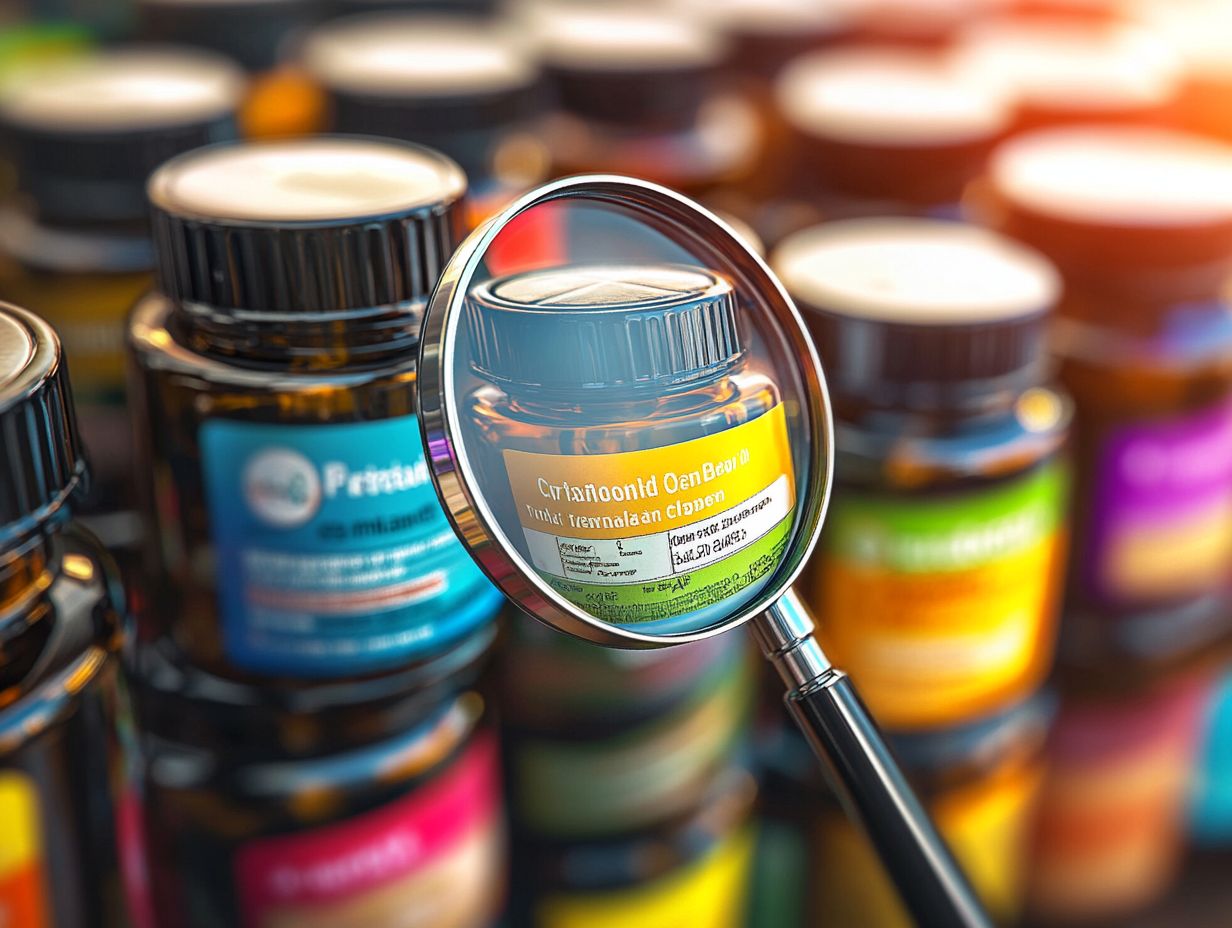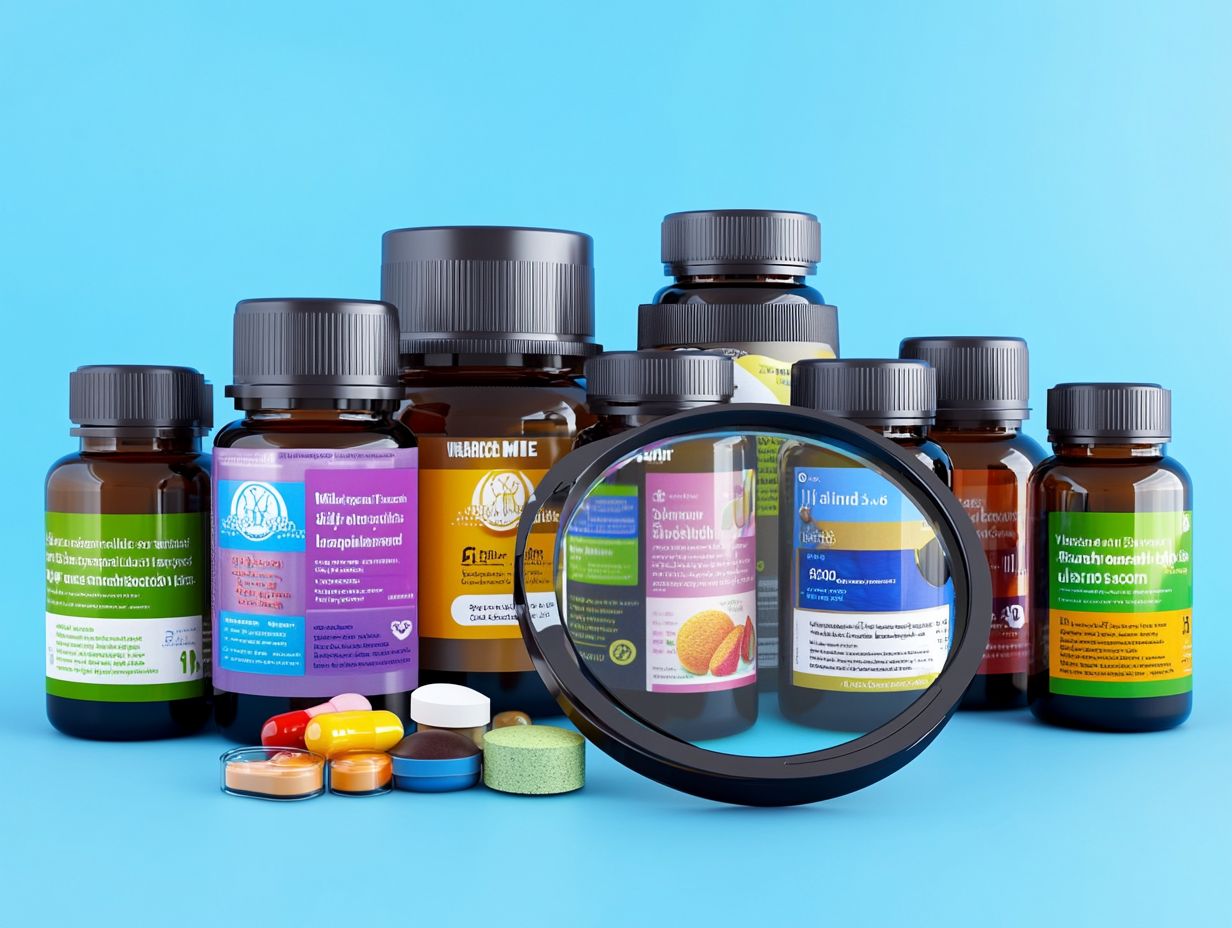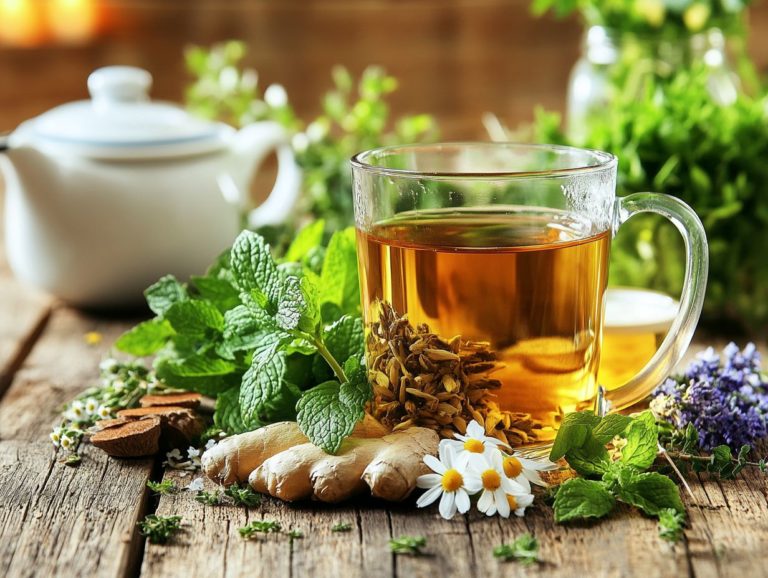What to Look for in Herbal Supplement Labels?
Herbal supplements have surged in popularity as individuals like you increasingly seek natural alternatives for health and wellness. With an abundance of options on the market, it can be overwhelming to decipher what these products truly offer.
Get ready to unlock the secrets of herbal supplements! You ll learn how to read and interpret labels, discover common ingredients and their uses, and understand the importance of quality and safety.
Additionally, this article will delve into potential interactions and side effects, highlighting the necessity of consulting with a healthcare professional.
Embrace this knowledge to empower your health journey!
Contents
- Key Takeaways:
- Understanding Herbal Supplements
- Reading and Interpreting Supplement Labels
- Common Ingredients in Herbal Supplements
- Ensuring Quality and Safety
- Potential Interactions and Side Effects
- Frequently Asked Questions
- What should I look for in herbal supplement labels?
- How can I tell if an herbal supplement is safe to use?
- Are there any warning signs to watch out for on herbal supplement labels?
- What should I do if I have a known allergy or medical condition?
- Can I trust the information provided on herbal supplement labels?
- What are some red flags to look out for on herbal supplement labels?
Key Takeaways:

- Always look for key information on herbal supplement labels, such as ingredients, dosage, and directions for use.
- Ensure the quality and safety of herbal supplements by seeking third-party testing and certification.
- Consult with a healthcare professional to avoid potential interactions and side effects when taking herbal supplements.
Understanding Herbal Supplements
Understanding herbal supplements is vital for you as a consumer eager to enhance your health through natural methods. Herbal supplements are dietary aids that include herbs, botanicals, or plant-derived substances, often celebrated for their potential health benefits, such as boosting immunity or elevating energy levels.
These products come in various forms, including herbal extracts, powders, and teas, each boasting a mix of dietary components that support specific health claims. It’s crucial for you to understand the importance of safety, effectiveness, and the quality assurance processes these products must undergo to meet health care standards.
What are Herbal Supplements?
Herbal supplements are dietary products sourced from plants, expertly crafted to enhance your health and wellness.
These natural remedies come in various forms, such as capsules, teas, and tinctures, each offering distinct benefits and modes of consumption. Capsules provide a convenient option, often containing powdered plant material that seamlessly fits into your daily routine. Teas offer a soothing experience, allowing you to savor the active compounds while enjoying a gentler absorption process.
Tinctures, which are concentrated herbal extracts made with alcohol, deliver concentrated doses that your body can easily absorb into the bloodstream. Unlike conventional medications that focus on managing symptoms, these supplements target the root causes of health issues, promoting holistic well-being. They harness the power of diverse botanicals, like echinacea, ginseng, and turmeric, to support your overall vitality.
Reading and Interpreting Supplement Labels
Reading and interpreting supplement labels is essential for you to make informed choices about herbal supplements and dietary components. Typically, a dietary supplement label features a supplement facts panel that provides crucial information on nutrient content, serving size, and active ingredients.
By understanding product labeling, you can effectively navigate the myriad of dietary supplement options available, ensuring they align with your nutritional needs and any dietary restrictions you may have.
Quality is crucial; it’s important for you to seek out certifications like USP verification and third-party testing to confirm that the products you choose are both safe and effective.
Start exploring herbal supplements today to enhance your health journey!
Key Information to Look for

When evaluating herbal supplements, look for key information such as allergen-free status and how the product is made and tested to ensure both safety and quality.
Scrutinize labels for essential nutrients and their precise concentrations. These specifics can significantly influence the supplement’s efficacy. It’s crucial to check for allergen warnings to prevent potential adverse reactions, especially if you have known sensitivities. Additionally, learning how to choose quality herbal products can further enhance your decision-making process.
The standardization process is vital as it guarantees consistency in active ingredient levels and product reliability. Follow these guidelines to confidently choose the best supplements for your health!
By ensuring that the supplements you select comply with FDA regulations, you protect your health while delivering the benefits you seek.
Common Ingredients in Herbal Supplements
Herbal supplements often contain various herbal extracts, vitamins, and minerals, each offering unique health advantages.
For instance, ginseng is frequently included for its potential to elevate energy levels and enhance cognitive function. Meanwhile, probiotics are renowned for their ability to improve gut health.
Vitamins and minerals are essential for meeting dietary needs and contributing significantly to overall health and wellness.
Understanding these ingredients and their specific benefits ensures you effectively meet your nutritional needs.
Popular Herbal Ingredients and Their Uses
Herbs like ginseng and ginger offer amazing health benefits and frequently appear in dietary supplement products.
These ingredients have gained considerable attention, not just for their traditional uses but also for the growing body of scientific evidence supporting their effectiveness. Ginseng is well-known for its ability to enhance energy levels and sharpen cognitive function, often being the focus of studies exploring its adaptogenic properties.
On the other hand, ginger is celebrated for its impressive digestive benefits; research indicates it can ease nausea and support healthy digestion, making it a favored remedy for various digestive issues.
By incorporating these herbs into your daily routine, you can tap into their potential health advantages and foster a more balanced lifestyle.
Ensuring Quality and Safety
Ensuring the highest quality and safety in herbal supplements is essential for safeguarding consumer health and maintaining trust in dietary supplement products. Prioritizing these factors protects individuals and reinforces confidence in the industry.
Third-Party Testing and Certification

Third-party testing ensures the quality and safety of supplements, offering you the assurance you seek as a consumer.
Organizations like NSF International and the United States Pharmacopeia (USP Convention) establish quality standards through their rigorous evaluation and testing methods. They meticulously examine the ingredients and manufacturing processes of supplements to ensure that products on store shelves meet specific safety criteria.
This certification process involves thorough inspections and laboratory testing, confirming that these products are both safe for consumption and effective in delivering their intended health benefits. To ensure you understand the proper usage, learn how to read herbal supplement labels for dosage. With this support from third-party testing, you can make informed choices about herbal supplements.
Potential Interactions and Side Effects
Herbal supplements can interact with medications. Always consult a healthcare professional before use. This step ensures that you make informed decisions about your health and wellness.
Consulting with a Healthcare Professional
Consulting a healthcare expert can prevent serious health risks. Don t hesitate get their advice today! It’s essential for anyone considering herbal supplements, as it helps navigate potential risks and benefits. These experts are invaluable in understanding dietary guidelines, ensuring that you fully grasp how different supplements might interact with your overall health plan.
They consider your unique health history, current medications, and specific dietary needs. Healthcare professionals are important in identifying any safety issues associated with these products, which helps uphold regulation and quality standards in the industry.
By seeking their guidance, you can incorporate herbal supplements into your health routine more safely and effectively, significantly reducing the risk of adverse reactions or ineffective treatments.
Frequently Asked Questions
What should I look for in herbal supplement labels?

When checking herbal supplement labels, focus on ingredients, dosage, and allergens.
How can I tell if an herbal supplement is safe to use?
One way to ensure safety is to look for certification seals from trusted groups that verify product quality, such as the United States Pharmacopeia or ConsumerLab.
Are there any warning signs to watch out for on herbal supplement labels?
Yes, be cautious of claims that seem too good to be true, misleading statements, and excessive use of buzzwords or marketing language.
What should I do if I have a known allergy or medical condition?
If you have a known allergy or medical condition, carefully read the ingredients list on herbal supplement labels, particularly the major food allergens, and consult with your healthcare provider before use.
Can I trust the information provided on herbal supplement labels?
While the Food and Drug Administration does regulate the labeling of dietary supplements, it’s crucial to research the manufacturer and the specific ingredients to determine their accuracy and reliability.
What are some red flags to look out for on herbal supplement labels?
Be cautious of supplements that make outrageous health claims, contain undisclosed or harmful ingredients, or lack contact information for the manufacturer on the label. Look for quality standards and third-party testing to ensure consumer assurance.






